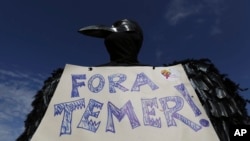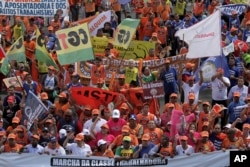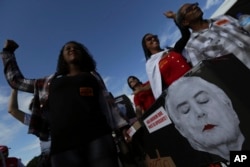Tens of thousands of demonstrators called for President Michel Temer's ouster on Wednesday and federal police asked him to give a statement in a corruption investigation as the pressure on the leader ratcheted up.
Scuffles broke out between police and protesters as the demonstrations neared Congress. Police fired tear gas and pepper spray, and some protesters tipped over portable toilets and set fires to create barricades between themselves and officers.
Temer is struggling to retain power after the release of a recording that appears to capture him approving hush money for a convicted former lawmaker. Brazil's top court is investigating him for alleged obstruction of justice and involvement in passive corruption. The president is resisting calls to resign and has said he will fight the accusations.
Federal police asked Temer to submit to questioning, the president's defense team said in a statement Wednesday. His lawyers called the request inappropriate since the recording, which Temer says was doctored, is still being analyzed. They said he would give testimony to a supreme court justice or answer his questions in writing, but refused to be questioned by a federal police investigator.
Temer's allies, aides under investigation
Even before the latest scandal broke, Temer's popularity was low, in part because of opposition to economic reforms he is trying to push through Congress. Several of his allies and aides have also been caught up in a wide-ranging corruption investigation that has jailed business leaders and senior politicians.
He lost yet another aide on Wednesday, when Sandro Mabel resigned. Mabel, who was one of four special advisers who have been linked to corruption allegations and have resigned or been fired, published a letter saying he needs to spend more time with his family.
In Brasilia, the capital, thousands of protesters marched toward Congress in an effort to stop proposed reforms to the country's retirement system and labor laws. Unions say the changes will take away workers' rights and unfairly reduce their pensions. Temer says those and other reforms are necessary to drag the economy out of a deep recession.
But protesters real target was the president himself, shouting “Out with Temer!” and carrying signs calling for immediate direct presidential elections.
Brazilians want changes in election process
If Temer resigns, the Constitution says that Congress would vote to elect the next president, who would hold power through the end of 2018. But many Brazilians, disgusted with the political class, want to vote themselves.
While the demonstration of around 35,000 people was initially peaceful, police and protesters began clashing as the protest neared Congress. Police in riot gear, some on foot holding shields and others on horseback, lined up near the chamber. The unrest began as protesters tried to break through a cordon, according to the capital's Security Department. In television images, police could be seen spraying tear gas or pepper spray.
In Rio de Janeiro, demonstrators gathered in front of the state assembly to protest proposed austerity measures.
“The state today is in a sea of debt because of corruption,” said Julio Cesar Azevedo, a leader of a union that represents prison guards. “It's not right that public servants are paying this bill.”
The state of Rio is in serious financial trouble and many public servants have received their salaries late or not at all.






